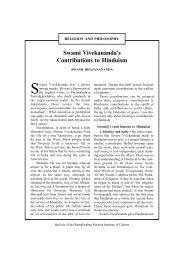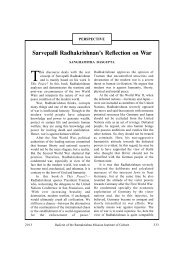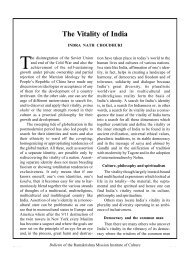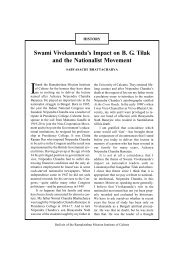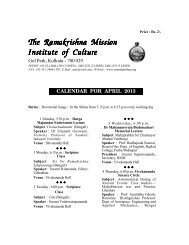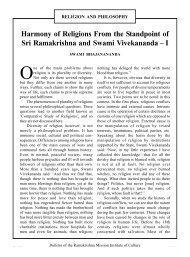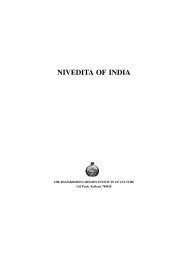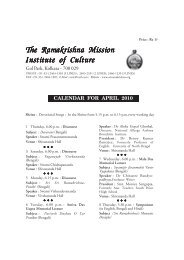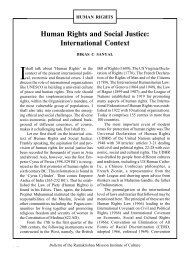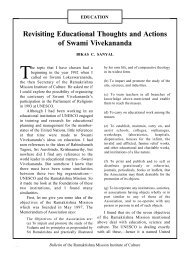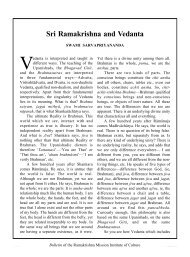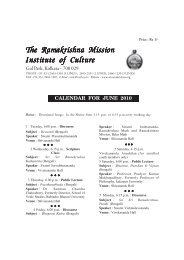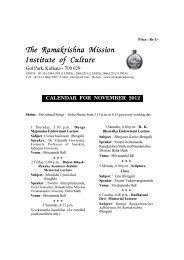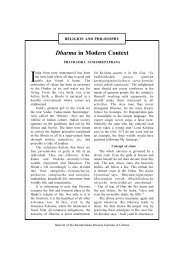All the World is a Stage - Ramakrishna Mission Institute of Culture
All the World is a Stage - Ramakrishna Mission Institute of Culture
All the World is a Stage - Ramakrishna Mission Institute of Culture
You also want an ePaper? Increase the reach of your titles
YUMPU automatically turns print PDFs into web optimized ePapers that Google loves.
ALL THE WORLD IS A STAGE<br />
<strong>All</strong> <strong>the</strong> <strong>World</strong> <strong>is</strong> a <strong>Stage</strong><br />
SWAMI TYAGANANDA<br />
One <strong>of</strong> <strong>the</strong> important things for serious<br />
spiritual seekers before figuring out<br />
<strong>the</strong> nature <strong>of</strong> God <strong>is</strong> to understand <strong>the</strong><br />
nature <strong>of</strong> <strong>the</strong> world in which <strong>the</strong>y live. How<br />
we look upon ourselves and how we look at<br />
<strong>the</strong> world around us <strong>is</strong> crucially important.<br />
Th<strong>is</strong> influences our understanding <strong>of</strong> life and<br />
understanding <strong>of</strong> God as well.<br />
Our scriptures suggest different ways <strong>of</strong><br />
looking at <strong>the</strong> world. One <strong>of</strong> <strong>the</strong> ways <strong>is</strong> to<br />
consider <strong>the</strong> world as one big <strong>the</strong>atre, one big<br />
play, one big cosmic stage. Never<strong>the</strong>less, <strong>the</strong><br />
moment we are born we see <strong>the</strong> world as real.<br />
Vedanta <strong>the</strong>refore puts <strong>the</strong> question: What <strong>is</strong><br />
<strong>the</strong> nature <strong>of</strong> <strong>the</strong> world in which we live? The<br />
world that Vedanta presents us <strong>is</strong> not real.<br />
Vedanta says, it <strong>is</strong> only a play—a cosmic one.<br />
The whole story <strong>of</strong> creation <strong>is</strong> after all a<br />
story. We know that in different religious<br />
traditions <strong>the</strong>re are different stories. In<br />
Chr<strong>is</strong>tianity you have <strong>the</strong> story <strong>of</strong> Adam and<br />
Eve. In <strong>the</strong> Puranas <strong>the</strong>re are many stories<br />
about how <strong>the</strong> creation began.<br />
Philosophically speaking, we have <strong>the</strong> màyà<br />
and <strong>the</strong> panchamahàbhutas (five elements<br />
such as space, air, fire, water and earth) and<br />
so on. Science speaks <strong>of</strong> <strong>the</strong> big bang. No<br />
matter how many versions are <strong>the</strong>re, Vedanta<br />
points out that it <strong>is</strong> only a play.<br />
We can put <strong>the</strong> question: If <strong>the</strong> world <strong>is</strong><br />
only a play, how it has become so real to us?<br />
In answer to that question we may say, that <strong>is</strong><br />
not really difficult to understand, for we<br />
know that fiction, at times, also becomes real.<br />
Why? Because once you are inside <strong>the</strong> story,<br />
it looks very different from what it would<br />
look like when you are outside. Once inside,<br />
you begin to notice <strong>the</strong> difference between a<br />
good actor and a bad actor. A good actor <strong>is</strong><br />
one who identifies himself completely with<br />
<strong>the</strong> character he portrays. In <strong>the</strong> 1930s or 40s,<br />
<strong>the</strong> actor, V<strong>is</strong>hnu Phadn<strong>is</strong>, who played <strong>the</strong><br />
title role in <strong>the</strong> hit Maharashtrian movie ‘Sant<br />
Tukàràm’, so deeply identified himself with<br />
<strong>the</strong> character <strong>of</strong> <strong>the</strong> saint that after <strong>the</strong> story<br />
was filmed he gave up h<strong>is</strong> career as an actor<br />
and took to <strong>the</strong> life <strong>of</strong> a recluse!<br />
Who would be a bad actor <strong>the</strong>n? One,<br />
who <strong>is</strong> unable to forget h<strong>is</strong> identity. As <strong>the</strong><br />
actor <strong>is</strong> not able to forget h<strong>is</strong> identity, <strong>the</strong><br />
audience too <strong>is</strong> not able to forget <strong>the</strong> identity<br />
<strong>of</strong> <strong>the</strong> actor. Whe<strong>the</strong>r a person <strong>is</strong> a good or a<br />
bad actor at <strong>the</strong> end <strong>of</strong> <strong>the</strong> day, he has to<br />
abandon <strong>the</strong> role.<br />
The question <strong>is</strong>: Every movie or play<br />
comes to an end. When would th<strong>is</strong> cosmic<br />
drama comes to an end? The answer <strong>is</strong>—<br />
never. Th<strong>is</strong> play <strong>is</strong> cyclic. A circle has no<br />
beginning or end. It goes round and round.<br />
So th<strong>is</strong> cosmic cycle goes on. That <strong>is</strong> why it<br />
<strong>is</strong> called samsàra-chakra, which <strong>is</strong><br />
constantly changing.<br />
Sometimes people say—th<strong>is</strong> world <strong>is</strong> a<br />
dream. The dream begins when we are in<br />
sleep and <strong>the</strong> dream ends when we wake up.<br />
So, you see, <strong>the</strong> dream has a beginning as<br />
well as an end. If you ask <strong>the</strong> dreamer while<br />
he <strong>is</strong> dreaming how old <strong>is</strong> h<strong>is</strong> dream world,<br />
he would reply that <strong>the</strong> dream world <strong>is</strong><br />
always <strong>the</strong>re—because <strong>the</strong> end <strong>of</strong> <strong>the</strong> dream<br />
world would mean end <strong>of</strong> <strong>the</strong> world. Th<strong>is</strong> <strong>is</strong><br />
<strong>the</strong> standpoint <strong>of</strong> <strong>the</strong> dreamer while he <strong>is</strong><br />
dreaming.<br />
We do not, however, see <strong>the</strong> world as a<br />
dream. We see it as real. Since we v<strong>is</strong>ualize it<br />
to be real we all become actors and not<br />
spectators. So <strong>the</strong> only way to stop <strong>the</strong> play <strong>is</strong><br />
to get out <strong>of</strong> <strong>the</strong> play. But if you are a good<br />
actor why would anybody let you go? So to<br />
get out <strong>of</strong> th<strong>is</strong> cosmic drama we need to be<br />
2012 Bulletin <strong>of</strong> <strong>the</strong> Ramakr<strong>is</strong>hna M<strong>is</strong>sion <strong>Institute</strong> <strong>of</strong> <strong>Culture</strong><br />
369
SWAMI TYAGANANDA<br />
bad actors. Once you are out <strong>of</strong> <strong>the</strong> play you<br />
become <strong>the</strong> audience.<br />
How to be a bad actor?<br />
Vedanta teaches us how to be a bad actor<br />
in th<strong>is</strong> cosmic play. The character<strong>is</strong>tic <strong>of</strong> a<br />
bad actor <strong>is</strong> not to forget one’s true identity.<br />
And Vedanta points out that my true identity<br />
<strong>is</strong> that I am âtman and nothing else. Swami<br />
Vivekananda asks, if we close our eyes and<br />
repeat a few times ‘I’, ‘I’, ‘I’, what flashes<br />
before our mind’s eye? First, it <strong>is</strong> <strong>the</strong><br />
physical appearance—<strong>the</strong> body-mind<br />
complex. Vedanta says that it <strong>is</strong> only a role<br />
that you are playing. That <strong>is</strong> not what you<br />
actually are! In reality you are <strong>the</strong> Spirit or<br />
âtman. The<strong>is</strong>tically, you may say that you<br />
are a child <strong>of</strong> God.<br />
Sri Ramakr<strong>is</strong>hna uses <strong>the</strong> analogy <strong>of</strong><br />
‘pàkà àmi’ and ‘kànchà àmi’—<strong>the</strong> ripe ‘I’<br />
and <strong>the</strong> unripe ‘I’—to explain th<strong>is</strong> point. The<br />
more we develop our affinity with God in<br />
some ways, <strong>the</strong> closer we go towards<br />
manifesting our true identity.<br />
The role model <strong>of</strong> a bad actor <strong>is</strong> Sri<br />
Ramakr<strong>is</strong>hna himself. He had to play <strong>the</strong> role<br />
<strong>of</strong> a priest <strong>of</strong> <strong>the</strong> Kali Temple at<br />
Dakshineswar. For a time he played <strong>the</strong> role<br />
nicely. But very soon it was d<strong>is</strong>covered that<br />
he could not play h<strong>is</strong> role properly. Once,<br />
instead <strong>of</strong> making food <strong>of</strong>ferings to<br />
Bhavatàrini, he made <strong>the</strong> <strong>of</strong>fering to a cat!<br />
And on ano<strong>the</strong>r occasion he placed on h<strong>is</strong><br />
own head flowers which were meant for <strong>the</strong><br />
Divine Mo<strong>the</strong>r!<br />
When we continue to remind ourselves<br />
who we really are—philosophically ei<strong>the</strong>r as<br />
Spirit or âtman which <strong>is</strong> beyond <strong>the</strong> bodymind-ego,<br />
or look upon ourselves as children<br />
<strong>of</strong> God—th<strong>is</strong> identity becomes so strong we<br />
find that for a while we are not able to play<br />
our roles perfectly. Gradually, we would<br />
become bad actors. When we change thus,<br />
<strong>the</strong> world also changes for us. That <strong>is</strong> <strong>the</strong><br />
most important thing to remember. What <strong>the</strong><br />
world appears to us <strong>is</strong> directly related to how<br />
we look at ourselves. When we v<strong>is</strong>it <strong>the</strong><br />
temple <strong>of</strong> Dakshineswar we see <strong>the</strong> image <strong>of</strong><br />
<strong>the</strong> Divine Mo<strong>the</strong>r. But that very image was<br />
viewed differently by Sri Ramakr<strong>is</strong>hna. He<br />
saw everything pervaded by divine<br />
Consciousness. When Sri Ramakr<strong>is</strong>hna went<br />
to Benaras, he saw it as a city <strong>of</strong> gold,<br />
svarnamayee Kàshi, ie a city effulgent with<br />
Consciousness, whereas we do not get such a<br />
v<strong>is</strong>ion when we v<strong>is</strong>it <strong>the</strong> place.<br />
The question ar<strong>is</strong>es: Why our v<strong>is</strong>ions are<br />
so different? The answer <strong>is</strong>, what we see<br />
externally <strong>is</strong> a very dim reflection <strong>of</strong> what we<br />
see within. Sri Ramakr<strong>is</strong>hna saw within<br />
nothing but <strong>the</strong> Mo<strong>the</strong>r. And hence what he<br />
saw outside was nothing but <strong>the</strong> Mo<strong>the</strong>r. Our<br />
propensity <strong>is</strong> to see things composed <strong>of</strong> gross<br />
matter. So what we see outside <strong>is</strong> <strong>the</strong> material<br />
world. It appears real to us only because <strong>the</strong><br />
limited identity that we cling on to <strong>is</strong> real to us.<br />
Vedantic message<br />
Now, Vedanta has a simple message for<br />
us all. If we are asked who we really are, we<br />
would answer that we are human beings. But<br />
if you look deeper you might ask yourself <strong>the</strong><br />
same question with <strong>the</strong> word real in it—Am I<br />
really a human being? Vedanta says, no, you<br />
are not. You are only playing <strong>the</strong> role <strong>of</strong> a<br />
human being. You are in fact a divine being.<br />
Spiritual life demands that we remind<br />
ourselves <strong>of</strong>ten about who we really are. If<br />
we consider ourselves to be real human<br />
beings, that would be a very advanced state in<br />
spiritual life. When we do japa or meditation,<br />
that <strong>is</strong> <strong>the</strong> time when we let go our roleplaying<br />
identities for <strong>the</strong> time being and try to<br />
connect ourselves with our true identity . We<br />
<strong>the</strong>n let go our identity with all o<strong>the</strong>r human<br />
relations—children, husband, wife, et al.<br />
We usually identify ourselves with so<br />
many things and interests in life that our true<br />
identity gets buried beneath <strong>the</strong>m. Vedanta<br />
asks us to d<strong>is</strong>own all such identities when we<br />
meditate and remind ourselves that we are<br />
<strong>the</strong> children <strong>of</strong> God. ‘I am <strong>the</strong> àtman’. ‘I am<br />
<strong>the</strong> spirit.’ If we are able to do that<br />
successfully even twice a day, <strong>the</strong>re <strong>is</strong> hope.<br />
If we pract<strong>is</strong>e th<strong>is</strong> we may make progress<br />
gradually. First we may remind ourselves at<br />
370 Bulletin <strong>of</strong> <strong>the</strong> Ramakr<strong>is</strong>hna M<strong>is</strong>sion <strong>Institute</strong> <strong>of</strong> <strong>Culture</strong><br />
August
ALL THE WORLD IS A STAGE<br />
least twice a day. Then, after a practice <strong>of</strong> a<br />
few weeks, we may remind ourselves <strong>of</strong> our<br />
true identity say, five or six times a day.<br />
Then after six months, maybe every hour.<br />
Find moments in life to remind yourself that<br />
you are a child <strong>of</strong> God. There lies in that<br />
relationship a deeper identity.<br />
The roles that we are all playing now are<br />
momentary and all <strong>of</strong> us are suffering from<br />
great agony, all feeling somewhat weighed<br />
down by <strong>the</strong> memories <strong>of</strong> <strong>the</strong> past and worries<br />
about <strong>the</strong> future. If you walk down <strong>the</strong> road<br />
you will find faces full <strong>of</strong> stress and strain and<br />
bogged down by its effect. It <strong>is</strong> very difficult<br />
to come across faces with innocent carefree<br />
laughter, and to find a truly happy person!<br />
Such has become <strong>the</strong> state <strong>of</strong> our lives today.<br />
Everybody <strong>is</strong> worried about something or <strong>the</strong><br />
o<strong>the</strong>r. If we can stave <strong>of</strong>f <strong>the</strong>se worries even<br />
for a few minutes each day and stop playing<br />
our roles for a while, we begin to remove <strong>the</strong><br />
baggage we are carrying. The moment th<strong>is</strong><br />
baggage <strong>is</strong> unburdened you will find that it <strong>is</strong><br />
easy to smile. If we ponder <strong>the</strong>se <strong>is</strong>sues a little<br />
we will find that all our identities are very<br />
fragile and short-lived. Everything <strong>is</strong><br />
momentary. If only we would know how to<br />
let go, <strong>the</strong> world would change for us that<br />
very moment. But curiously we feel safe<br />
when we cling on to <strong>the</strong> fleeting identities.<br />
We cannot get rid <strong>of</strong> th<strong>is</strong> clinging. However,<br />
giving up clinging does not mean giving up<br />
everything; it means just changing our<br />
standpoint. Instead <strong>of</strong> being a player in th<strong>is</strong><br />
world, be a witness, become an observer.<br />
Sri Ramakr<strong>is</strong>hna once said that if a fried<br />
seed <strong>of</strong> rice <strong>is</strong> sown in <strong>the</strong> soil it would not<br />
germinate. Just so, if a man <strong>is</strong> fried in <strong>the</strong> fire<br />
<strong>of</strong> knowledge he cannot take part in <strong>the</strong> play<br />
<strong>of</strong> creation anymore. He <strong>is</strong> <strong>the</strong>n a jivanmukta<br />
(liberated while living in <strong>the</strong> body). Such<br />
persons view <strong>the</strong> world as a shadow, while it<br />
appears to us to be very much real. Since<br />
<strong>the</strong>y see <strong>the</strong> world as shadow <strong>the</strong>y are not<br />
affected by it. We see it as real and are<br />
affected by its changing face.<br />
According to Vedantic thinking, <strong>the</strong><br />
world itself <strong>is</strong> not much <strong>of</strong> a problem. The<br />
jivanmuktas saw <strong>the</strong> world. Sri Ramakr<strong>is</strong>hna<br />
at Dakshineswar saw <strong>the</strong> world. He laughed,<br />
joked, talked and preached to people who<br />
v<strong>is</strong>ited him. Then, what <strong>is</strong> <strong>the</strong> difference?<br />
Th<strong>is</strong> difference <strong>is</strong> significant. We see <strong>the</strong><br />
world as real, but <strong>the</strong>y see it as a shadow.<br />
That <strong>is</strong> why <strong>the</strong>y are not affected by it. We<br />
too are not affected by a horror movie<br />
because we are in <strong>the</strong> audience. <strong>All</strong> <strong>the</strong><br />
horrific things happen on <strong>the</strong> screen.<br />
Similarly, we have a choice. We may see <strong>the</strong><br />
good or bad happenings <strong>of</strong> <strong>the</strong> world as real,<br />
or we may see <strong>the</strong>m as parts <strong>of</strong> <strong>the</strong> play. If we<br />
can see <strong>the</strong> world as a play we have <strong>the</strong><br />
freedom to continue enjoying <strong>the</strong> movie<br />
(cosmic play) no matter how terrible it might<br />
seem at times.<br />
You may now ask <strong>the</strong> question: How<br />
long we are to sit and watch <strong>the</strong> play? You<br />
do not have to watch at all if you are<br />
unwilling. At any moment you may leave <strong>the</strong><br />
<strong>the</strong>atre hall.<br />
We may look at <strong>the</strong> world as màyà, as a<br />
cosmic sacrifice, as a yajna, or as a divine<br />
yoga. In <strong>the</strong> Gità (11.8) Sri Kr<strong>is</strong>hna tells<br />
Arjuna, ‘pashya me yogam a<strong>is</strong>hvaram’. So,<br />
<strong>the</strong>re are many different ways <strong>of</strong> looking at<br />
<strong>the</strong> world. Viewing it as a stage <strong>is</strong> one such<br />
idea. There <strong>is</strong> a saying in one <strong>of</strong> our<br />
scriptures that if something <strong>is</strong> not going to<br />
happen, <strong>is</strong> not going to happen. If something<br />
<strong>is</strong> going to happen, nobody can stop it from<br />
happening. Th<strong>is</strong> awareness destroys <strong>the</strong><br />
po<strong>is</strong>on <strong>of</strong> anxiety and removes all delusion.<br />
So play your role well without forgetting<br />
your real identity. But remember, what <strong>is</strong><br />
going to happen shall happen; and what <strong>is</strong> not<br />
to happen will not happen. If we remember<br />
th<strong>is</strong>, we will be able to let go our false,<br />
ephemeral identities and become truly free. •<br />
* Swami Tyagananda <strong>is</strong> Min<strong>is</strong>ter-in-Charge, Ramakr<strong>is</strong>hna Vedanta Society, Boston, U.S.A. Th<strong>is</strong><br />
article <strong>is</strong> based on <strong>the</strong> transcript <strong>of</strong> h<strong>is</strong> lecture delivered at <strong>the</strong> <strong>Institute</strong> on 20 August 2011.<br />
2012 Bulletin <strong>of</strong> <strong>the</strong> Ramakr<strong>is</strong>hna M<strong>is</strong>sion <strong>Institute</strong> <strong>of</strong> <strong>Culture</strong><br />
371



